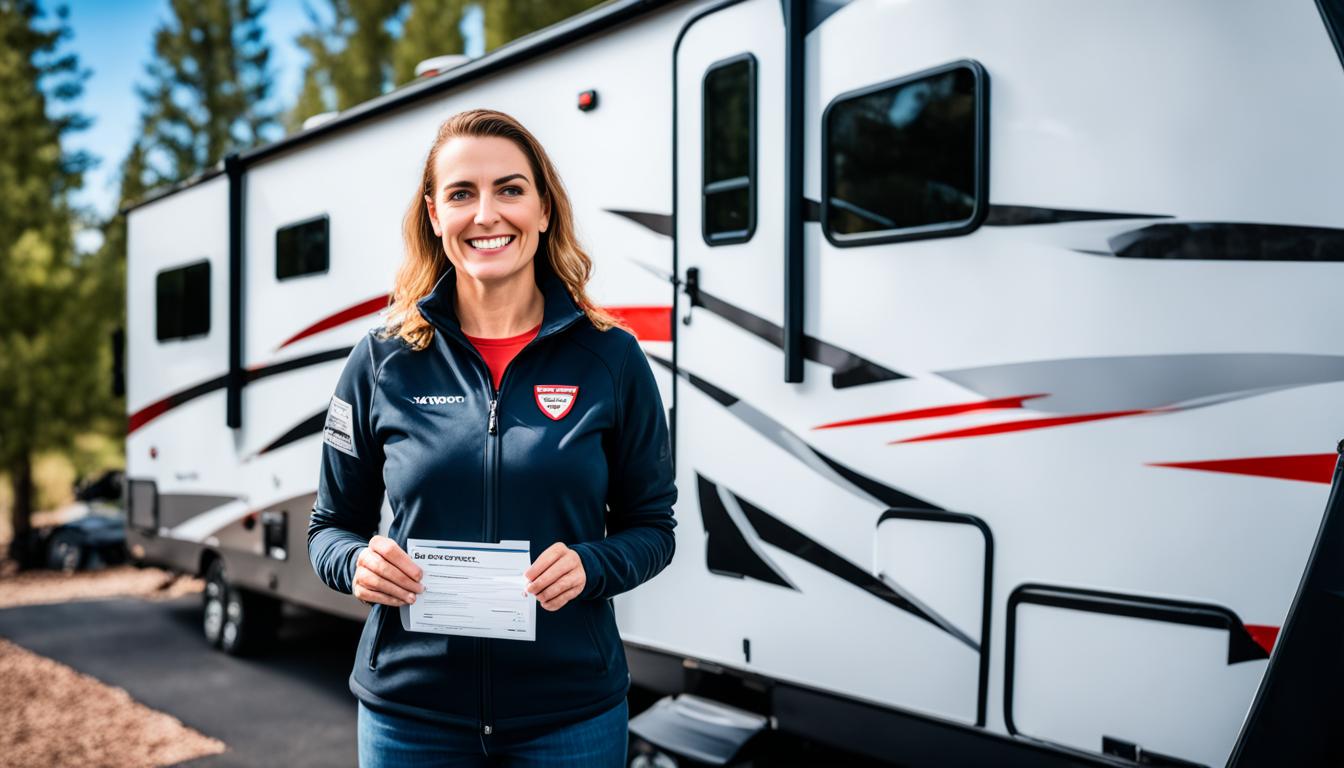Do I need a title to sell my RV?
March 21, 2025 2:10 pm
Ever wondered if you really need a title to sell your RV? This question might seem simple, but it’s actually quite complex. The RV title transfer process can be confusing. It often makes sellers wonder if they can sell without one.
As more people want to buy used RVs, knowing if you need a title is key. This is important because of the growing interest in outdoor travel. Let’s explore the details of selling your RV, with or without a title. We’ll also look at the best ways to make your sale smooth and successful.
Key Takeaways
- The demand for used RVs increases when demand outpaces supply, creating a favorable selling environment.
- The spring season is noted as a popular time for RV buyers, which can boost sale prices.
- Sellers often prefer quick sales methods, such as consignment or trading in at dealerships.
- The process of selling an RV privately may take longer and requires thorough preparation.
- Selling an RV with a title makes the transfer process easier and less complicated.
- Being open and providing detailed listings, including good photos, can build trust and speed up sales.
- Using secure payment methods like wire transfers or cashier’s checks can help avoid scams.
Understanding RV Title Requirements
When you sell an RV, knowing about RV title rules is key. It’s not just about the law; it makes the sale go smoothly. So, why is a title so important? It’s because it follows the rules and protects both sides.
A title is vital for RV sales because it proves who owns the RV and stops fake sales. About 45 states in the U.S. need an RV title for it to be legal and safe to use. Each state has its own rules, like Alabama for RVs over 3,000 lbs and Colorado for motorized ones over 4,500 lbs. If you don’t follow these rules, you could face fines and penalties.
In Texas, you must transfer an RV title to show you own it and follow the law. You’ll need the current title, a special form, and sometimes a lien release. In Indiana, you have 60 days to get a title after buying, showing the owner’s duty.
Selling without a title can lead to big problems. The DMV won’t accept titles with mistakes or erasures. If a title is wrong, you need a new one to sell. Also, a lienholder must give proof of lien release to avoid the RV being taken back.
Every state has its own rules for selling an RV. For example, in New York, you must fill out a Damage Disclosure Statement. In New York, “Rebuilt Salvage” RVs need a DMV check for stolen parts before they can be registered or titled. This shows the importance of following the rules.
Knowing the RV title rules is essential for a smooth sale. Whether you’re in Alaska, Florida, or California, each state has its own rules. By following these, sellers and buyers can avoid legal trouble and make the transfer easy.
Selling an RV Without a Title
Selling an RV without a title can be tough, but it’s doable. About 25% of RV owners face issues because they don’t have the title. This section will guide you on what to do if you lose or can’t find the title.
If you’ve lost the title, apply for a duplicate one quickly. Most states have a process for this. You’ll need to fill out forms and provide ID and possibly a lien release. The cost is usually between $10 and $50, and it can take a few days to weeks to get it.
While waiting for the new title, you can get a Vehicle Transit Permit. It’s good for five days and lets you drive the RV to the tax office or other places.
If getting a duplicate title is hard, use a notarized Bill of Sale. It’s needed in 50% of states to prove the sale. In states where titles are required, about 70% of RV sales need one to transfer ownership.
Buyers like RVs with all the papers, including the title and maintenance records. About 60% of buyers look at maintenance records before buying. RVs with full documentation sell 30% faster and for 10-15% more.
If your RV has a salvage title, be honest with the buyer. About 30% of RV sales are salvage titles. Being open can make the sale easier.
Lastly, list all the features and amenities of your RV. This can help sell it faster. Only 20% of sellers use a dedicated email for inquiries. This can help you not miss any interested buyers.
Do I Need a Title to Sell My RV?
When selling an RV, understanding the buyer’s view on titles is key. Titles prove ownership, ensuring the sale is clear of legal issues. This is a must for buyers, making a valid title essential for sellers.
Dealing with a lien on the RV adds complexity. Sellers must clear the lien or get a release. To transfer the title, you’ll need the current title, a bill of sale, and a completed Application for Texas Title (Form 130-U). You’ll also need valid ID and the lien release if there is one.
The title transfer process must be done quickly and correctly. Everyone involved must sign the transfer documents. You must also pay the required fees, like title transfer and sales tax, as set by Texas laws. From the buyer’s point of view, these steps ensure a clean transaction.
- RV consignment fees usually range from 10-15% of the sale price.
- Dealers might offer $10,000 to $15,000 less than private prices for RVs.
- An RV in good condition can greatly increase its value.
- Sellers can get 85-90% of the sale price after dealer fees on consignment sales.
- To sell an RV without a title, you need a new one, with different rules by state.
- About 75% of U.S. states require a title for RVs to register and operate them.
- In Alabama, RVs over 3,000 lbs need a title.
- The title fee in Mississippi is $4 plus $17 for each lien holder on the application.
Selling an RV without a title means getting a new one, with rules varying by state. Some states, like Alaska, don’t need RV titles. But, following state rules, like in New Jersey where all RVs need a title, is key to avoid problems. About 30% of RV sales face issues due to missing title documents, showing the need for careful documentation.
For buyers, having all the right documents, like maintenance records and warranty details, builds trust. It makes the sale process faster. Buyers are more likely to buy when they know they’re getting a vehicle with clear ownership and proper documentation. This focus on detail makes transactions smooth and successful for everyone.
Conclusion
Understanding how to sell an RV can make a big difference. The question, do I need a title to sell my RV? depends on your state’s rules. Each state in the USA has its own rules, so it’s key to know your local DMV laws.
For example, some states like Louisiana and Maryland need a notarized Bill of Sale. But others, like Arizona, don’t. Knowing your state’s rules is vital for a legal and successful sale.
If you’re selling an RV without a title, getting a duplicate title is essential. Replacing a lost RV title costs between $10 and $50. The time it takes to process can also vary, affecting your sale’s timing.
For RVs that don’t work anymore, selling to junk RV companies is a good option. These companies often offer free removal across the USA. This makes selling easier for you.
The transferring RV title process is more than just having the title. You’ll also need proof of insurance, maintenance records, and sometimes emission tests. It’s important to be open about any issues, like tire or roof conditions, to build trust with buyers.
Having a sales contract is a good idea to outline the sale’s terms. This can include fees for local registration and title transfer. In some places, you might need a notarized signature and a state vehicle inspection. With the right preparation, you can sell your RV smoothly and securely.
Categorized in: Sell My RV Today





Comments are closed here.